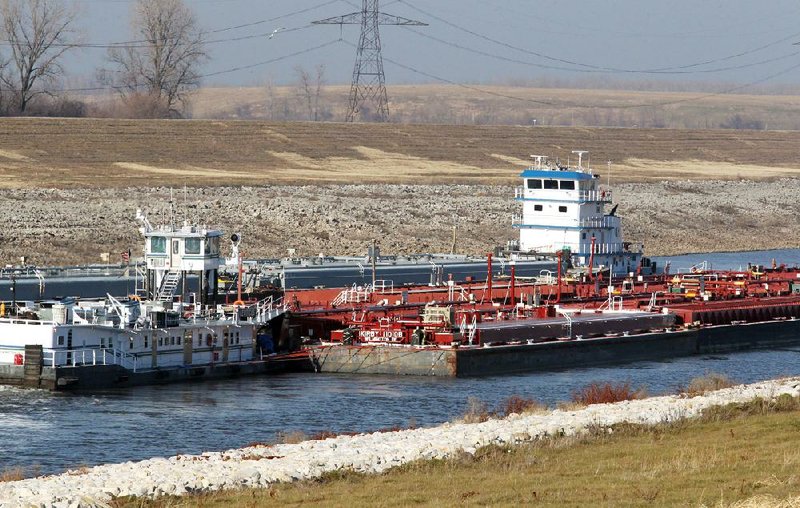LITTLE ROCK — Barge operators on the Mississippi River say the emergency dredging and rock removal aimed at keeping the nation’s busiest waterway open at least for this month won’t be enough to beat the worst drought in 80 years.
“The only way that we could maintain a navigable channel would be releases from the Missouri River system” if the Mississippi’s conditions worsen, Scott Noble, a senior vice president for Ingram Barge Co., said Monday at a meeting in southern Illinois. That option is “probably not very likely,” he said later in an interview.
Shipping company officials joined the U.S. Coast Guard, the Army Corps of Engineers and lawmakers including Sen. Richard Durbin, an Illinois Democrat, Monday in Thebes, Ill., a town on the river where rocks pose the greatest hazard to river traffic. Emergency dredging and excavation work will keep the river navigable for most tows at least through this month, Corps of Engineers officials said.
The Mississippi River in a typical January carries as much as $2.8 billion in cargo, including grain, coal and crude oil, according to the American Waterways Operators, an Arlington, Va.-based industry group. The worst drought since the 1930s has exposed rock formations and shrunk the river to levels that may become too shallow for navigation.
“We are not out of the woods, and further assurances are needed to provide industry with certainty that is needed for sound business and transportation planning beyond January,” said Tom Allegretti, chief executive officer of the waterways group. River depths less than 9 feet may impede tows, the operators have said.
The Army’s engineers declined to forecast navigation conditions for next month or beyond. While precipitation typically increases during the spring, the past isn’t always an accurate indication of the future, said officials including Noble of Nashville, Tenn.-based Ingram.
“We’re not sure what to expect anymore, and that’s why we’re probably being a little more cautious and a little more anxious,” Noble said.
The Mississippi River has dropped to about half its normal level for early January, according to data from the Corps.
AEP River Operations LLC, which owns barges and towboats that ply the river, has a customer that next month plans to move cargo from New Orleans to Chicago, and closing the waterway might force the shipment onto rail, a more costly option, Martin Hettel, senior manager of bulk sales at the St. Louis-based company, said at the briefing.
“Right now we can’t tell them” how their goods will need to be moved, said Hettel, who declined to name the company or the product. A decision must be made by Jan. 20-25, “when they load the vessel,” he said.
Just north of Thebes, about 128 miles south of St. Louis, dredging boats operating from 6 a.m. to 10 p.m. cluster in the narrowing river. Tractors on board the vessels scoop mud from the riverbed. Exposed bedrock pokes through the surface of the river, creeping up its banks.
A single towboat with cargo-laden barges, waiting to pass through the work site, is visible beyond the dredging vessels. Other boats wait to negotiate a bend in the river, said Mike Petersen, a Corps spokesman. At night, the river is open for barges, said Thebes Mayor John Kennedy, a Lowe’s Co. manager.
“It seems like it’s running pretty smoothly in the evenings,” though he’s never seen the river this low, Kennedy said in an interview.
Commodity exporters including Archer-Daniels-Midland Co. of Decatur, Ill., and St. Louis-based Peabody Energy Corp., the largest U.S. coal producer, ship on the river. A disruption might upend U.S. exports, which the Obama administration plans to double by 2014 from 2009 levels.
Shippers were at odds with the Corps last week after a National Weather Service forecast showed the river may drop below 9 feet this week and become hazardous for most tows by the middle of the month. The Mississippi River at Thebes is now at 11 feet, a reading that will be unchanged at least through this month because contractors will deepen the channel by at least 2 feet this week, Maj. Gen. John Peabody, commander of the Corps’ Mississippi Valley region, said Monday.
That means barges, which have been carrying less cargo because of shallow water, can begin increasing their loads again.
In normal conditions, tows need 12 feet of water to operate and can haul 25 barges, each weighing about 2,000 tons, according to Noble. A 10-foot channel reduces the load to about 15 barges of 1,500 tons each. Noble said in 9 feet of water, there are eight or nine barges per towboat at about 1,300 tons each, or 35 percent less than in typical conditions.
Business, Pages 25 on 01/09/2013
